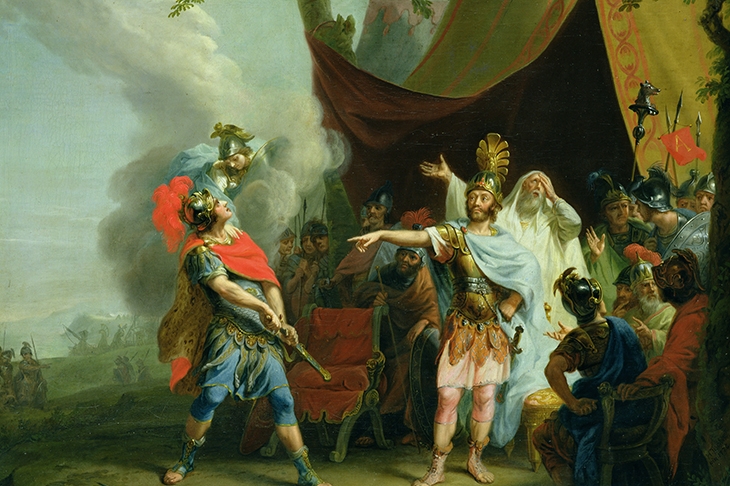Sing muse, begins The Iliad, of the wrath of Achilles. We are dropped straight into the tenth year of the Trojan war, in the middle of the Greek encampment outside the besieged city. The great warrior Achilles has been awarded a woman, Briseis, in recognition of his victories. The same distribution of booty sees Agamemnon, the leader of all the Greeks, acquire the young Chryseis. Rape, assault and erasure of identity are the ever-present consequences of war for women in the Bronze Age, just as they are now. But Chryseis is different: her father is a priest of Apollo, and he comes to the Greek camp to demand the return of his daughter.
Agamemnon refuses at first, but is then forced to relinquish his prize when Apollo hears his priest and attacks the Greek camp with plague. In a fit of pique, Agamemnon takes Briseis from Achilles, and so the greatest sulk in literature begins. Achilles withdraws from the battle, heedless of the destruction which the Trojans wreak upon his fellow Greeks.
Pat Barker’s affecting new novel, The Silence of the Girls, begins slightly earlier in the story, when Briseis is captured in a raid masterminded by Achilles. His incredible fighting prowess is powerfully described by a woman whose life is being destroyed by it: ‘My husband… died with both hands gripping Achilles’ spear, as if he thought it belonged to him and Achilles was trying to take it away.’
Briseis is a memorable creation (Homer’s version has little character, so this is all Barker’s imagination). She is numb with shock at her terrible losses. But right from the start of the novel, we see that she is no sentimentalist. Her vicious mother-in-law has been wasting away from an unknown illness and Briseis goes to check on her as their citadel is about to fall to the Greeks: ‘I had no reason to love her, but what made me angry at that moment was that in allowing herself to dwindle until she was nothing more than a heap of creased flesh and jutting bone, she’d left me with so very little to hate.’
Barker has always written brilliantly about war, about battles and about the interior lives of often nameless fighting men. The Regeneration trilogy left her readers living and breathing alongside her battered, broken soldiers. The Silence of the Girls lacks some of the potency of those novels, because of the strangely clunky anachronisms. It doesn’t matter too much if Priam enchants a young Briseis with magic tricks involving coins and sweets, although the Trojan war happens many centuries before either money or sugar. But there’s also a hospital hut, a knowledge of how to treat infection, and tents containing cupboards and sideboards. Briseis seems to know things (about time, particularly, and language) which a Bronze Age person could not have done.
Although it is densely imagined and beautifully written, these things mount up to strand the book in an uncomfortable no-man’s-land, somewhere between the Troad Peninsula and a couple of miles down the road from Ypres.






Comments